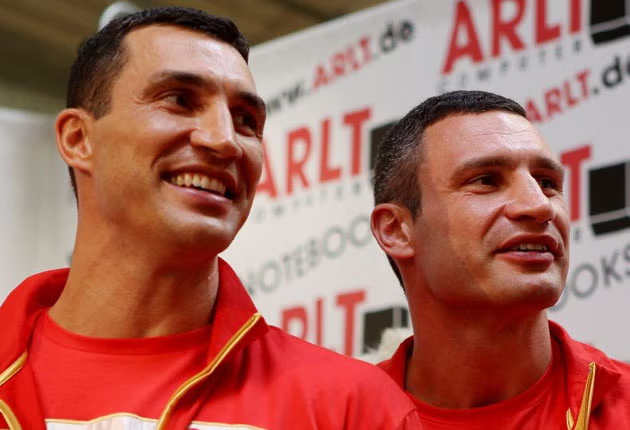How Klitschkos came to rule German fight game
Ukrainian brothers are box-office gold in their adopted nation, so Wladimir's fight with David Haye will be huge. Steve Bunce reports

Your support helps us to tell the story
From reproductive rights to climate change to Big Tech, The Independent is on the ground when the story is developing. Whether it's investigating the financials of Elon Musk's pro-Trump PAC or producing our latest documentary, 'The A Word', which shines a light on the American women fighting for reproductive rights, we know how important it is to parse out the facts from the messaging.
At such a critical moment in US history, we need reporters on the ground. Your donation allows us to keep sending journalists to speak to both sides of the story.
The Independent is trusted by Americans across the entire political spectrum. And unlike many other quality news outlets, we choose not to lock Americans out of our reporting and analysis with paywalls. We believe quality journalism should be available to everyone, paid for by those who can afford it.
Your support makes all the difference.During the last decade the Klitschko brothers have dominated the relatively new and unique boxing business in Germany and this Saturday's fight in Hamburg is expected to be the biggest so far to feature either of the delightful émigré boxers.
On Saturday there is a chance that the record for the attendance at a live fight will be shattered and there is every chance that both the number of fans watching on television and the percentage of the audience tuning in will be the best for over a decade. The Klitschko brothers are big in a business that deals only in big events and big fights, which makes it unique in the boxing world; there is no small-hall culture, no York Hall equivalent on a Tuesday night on the Rhine.
All of the recent fights involving a Klitschko brother have done excellent business at the box office and on television, as has Wladimir Klitschko's opponent on Saturday, David Haye, by the way. A Klitschko fight is an event in Germany with marquees set up near the arena or stadium to deal with the after-fight crowd. Recent entrances have included a live set from the Pussycat Dolls, who performed from the centre of the ring, and a quite astounding ringwalk by Vitali, the elder of the two brothers, between holograms of modern heavyweights wishing him the best from behind a beam. It was a Star Trek classic.
But how did the Klitschko brothers come to dominate German boxing? They simply followed fighters from the old Soviet bloc and, when it came time to discard their vests, they based their professional careers in Germany. They fought as amateurs for Ukraine and are old enough to have been part of the Soviet system that identified talented sportsmen and women and placed them in sporting academies. Wladimir won an Olympic gold in Atlanta and made his professional debut a few months later in Germany: Vitali turned professional the same night.
"The German boxing business really started in 1992 when my dad did the deal for [German boxer] Henry Maske with [TV channel] RTL," insists Kalle Sauerland, whose father Wilfred kept the business ticking over for 15 years before the Maske deal.
"The Germans love their boxing but they have a funny way of showing it," said Frank Maloney, who in 1997 took his Irish heavyweight Kevin McBride to fight Axel Schulz in Berlin. "They don't say a word, they just sit there and when it's over they go crazy. But, don't think they don't care because they show up in their thousands and they are loyal."
In the list of the most watched sports events in German history, nine of the top 10 places are currently occupied by either Maske or his heavyweight counterpart Schulz; Wladimir Klitschko will change that this weekend against Haye. Now the Klitschko brothers rule supreme, with massive outdoor fights generating crowds of more than 40,000 on a regular basis and television figures of between 11 million and nearly 14 million for their fights. The brothers have performed better than the German national football team on occasion, including last year when Wladimir easily beat the reluctant American "Fast" Eddie Chambers in front of 51,000 people in Düsseldorf.
"Most of the success I have achieved has been in Germany," adds Wladimir. "Germany feels like home and the fans feel like my fans. We love the fans, we fight for the fans and they come out and support us. It's a special relationship."
Wladimir was an ambassador for Germany's (failed) 2018 Ryder Cup bid and both brothers have the same role for Ukraine at next year's European Championship. They are smart, tall, athletically gifted and they are forever praising Mrs Klitschko, their dear old mum; dream athletes in many ways. Wlad still talks about the purity of boxing – less so since his association with Haye, whom Wlad has dubbed "the king of crudity".
However, they are still safety-first fighters and that is why they are not stars in America. They are respected, and the Haye fight, which will be shown on television giant HBO, could very well be the fight that changes the landscape. Haye, meanwhile, is crude, rude, ruthless, exciting and not very German.
Join our commenting forum
Join thought-provoking conversations, follow other Independent readers and see their replies
Comments